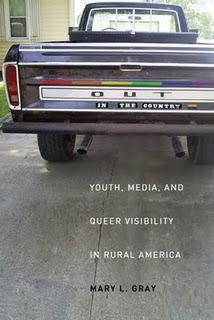Out in the Country: Youth, Media, and Queer Visibility in Rural America

The town I grew up in—Athens, Georgia (pop. 100,266)—is generally known for two things: indie music (a la REM, Elephant 6, and Kindercore) and the University of Georgia, both of which play a major role in maintaining the town's liberal leanings. However, Athens doesn't lean too far. It's still a place where college football dominates from Labor Day to Christmas, and if you're not in church on Sunday morning, you are assumed to be riddled with sin.
Coming up in an environment rife with contradiction, I learned a lot about peaceful co-existence through plausible deniability. (He's not gay; he's just eccentric.) Sure, we had an annual human rights festival where the young and old listened to people like UGA law professor Eugene Wilkes speak about the need for student activism to combat the world's ills, but mostly they were there for the music. One can only ask so much from a small town in the South, and once my identity as a radical queer feminist began to set in, Athens began to feel stifling. So as soon as I was able to, I did as gay rights icon Harvey Milk instructed, and fled to the nearest city.
The city, however, was not the activist paradise I'd imagined it would be. I did find a lot of feminists and socialists and anti-racists and queers with whom I could link arms and "fight the good fight," but I lost that sense of community I'd always known at home. What good was knowing someone would show up at a protest if you couldn't count on them to show up when your car dies and you need to get to work? What good were late night conversations about Spivak when you couldn't tell someone you were late with the rent (again)? I knew I'd lost something in the transition from small to large, and while I was happy with what I'd gained, I still questioned whether it was enough. I wondered if it were possible to reconcile being in a place where no one is a stranger with the benefits one gains when one is able to be anonymous.
Enter Out in the Country: Youth, Media, and Queer Visibility in Rural America. I recently interviewed Mary Gray for WireTap Magazine after reading her groundbreaking new book about the myths and mysteries of being queer in small town America. The book resonated with me deeply, as Gray (herself a former queer rural youth) explains how the current gay rights movement excludes rural LGBTQ issues and constructs a queer identity that increases rural queer invisibility. She provides strategies for altering the course to address their needs without requiring re-location (a luxury that is not always attainable or desired) or conformity to a falsely homogeneous queer standard.
Out in the Country was like a breath of fresh country air—just what this Georgia girl needed.
Cross-posted to Bitch Magazine's On the Map blog
This sounds like a really good book. I think there is an assumption that LTQBG people don't exist outside of cities, and yet I know that isn't so. Doesn't seem like that gets addressed a whole lot.